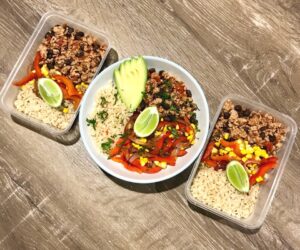How the 28 Day Weight Loss Challenge can benefit mums with diabetes
Diabetes is a growing concern for the UK, with people being diagnosed every day.
In this article, Nutritionist Elisha Danine sheds light on the causes, making healthier food choices and how The Healthy Mummy’s 28 Day Weight Loss Challenge can benefit people with diabetes.

What is Diabetes and what are the causes?
Diabetes is a condition where there is too much glucose (sugar) in the bloodstream. Glucose is an important source of energy for your body.
It comes from carbohydrate foods that you eat, such as bread, pasta, rice, cereals, fruits, starchy vegetables, milk and yogurt.
Your body breaks down carbohydrates into glucose, which then enters your bloodstream.
There are four clinical classes of diabetes:
1. Type 1 diabetes – results from ß cell destruction due to an autoimmune process usually leading to insulin deficiency.
2. Type 2 diabetes – a largely preventable, chronic and progressive medical condition that results from two major metabolic dysfunctions: insulin resistance and then pancreatic islet cell dysfunction causing a relative insulin deficiency.
3. Gestational diabetes mellitus (GDM) – any degree of glucose intolerance with onset or first recognition during pregnancy.
4. Other specific types of diabetes – due to other causes such as genetic defects in ß cell function, genetic defects in insulin action, diseases of the exocrine pancreas (e.g. cystic fibrosis), and drug- or chemical-induced causes (e.g. in the treatment of HIV/AIDS or after organ transplantation).
Dietary advice
Current dietary advice for Diabetics is controversial.
The advice of eating carbohydrate rich foods are based on the old fear of naturally fatty foods. There are no quality studies showing that a carbohydrate rich diet is beneficial.
Protein is less likely to raise blood sugars than high starchy carbohydrate foods. In a 2008 study, 16 obese patients with type 2 diabetes started a diet eating proportions of 20% carbohydrates, 30% protein and 50% fat. They all lost weight, lowered their BMI, total cholesterol was down and blood sugars dropped on average 1.2 points.
Eating protein rich meals or protein snacks is a good option for those with any of the above mentioned types of diabetes.
Healthy eating for people with diabetes is no different from what is recommended for everyone else. There is no need to prepare separate meals or buy special foods and the whole family can enjoy the same healthy meals.
To make healthy food choices:
- eat regular meals in the amounts that are right for you,
- choose high-fibre, lower glycaemic index carbohydrate foods,
- limit foods that are high in saturated fat and choose healthy fats instead,
- include quality protein foods with your meals
When putting together a healthy meal: fill half of your plate with a variety of non-starchy vegetables or salad, fill a quarter of your plate with a quality protein source, such as beef, lamb, pork, chicken, fish/ seafood, tofu, legumes or eggs. Fill a quarter of your plate with a carbohydrate food that has a lower glycemic index (GI), such as basmati rice, quinoa, legumes (such as chickpeas, kidney beans, lentils), barley, corn, or sweet potato.

Include healthy fats and oils as part of a balanced meal – such as extra virgin olive oil in cooking or as a salad dressing, avocado as a spread or nuts in a stir-fry or salad.
What to drink?
It’s important to stay hydrated throughout the day. Water is the best drink, but alternatives include:
- mineral water or soda water flavoured with sliced lemon/lime/frozen berries/cucumber/fresh mint
- black/oolong/green/herbal tea
- coffee or decaffeinated coffee with alternative milks such as soya or almond milk
- As an occasional substitute diet cordial with water may add variety without extra sugar or kilojoules
Healthy snacks
Some people with Type 1 or Type 2 diabetes may need to include a carbohydrate based snack between meals. This will depend on your body weight, physical activity levels and the type of medication or insulin you take to manage your diabetes.
The best choices to make include:
- a small tub of Greek/natural yogurt
- a serve of fresh fruit such as an apple or pear with the skin on
- a wholegrain crispbread spread with ricotta cheese, peanut butter or avocado
Gestational diabetes
Gestational diabetes is a form of diabetes that occurs in women during pregnancy.
About 12–14% of pregnant women will develop gestational diabetes, usually around the 24th to 28th week of pregnancy. Most women will no longer have diabetes after the baby is born. However, some women will continue to have high blood glucose levels after delivery.
Choose the right type and amount of carbohydrate foods. Carbohydrate foods are an important source of energy for your body, especially during pregnancy. These foods include breads and cereals, grains, starchy vegetables, fruit, legumes, yogurt and milk.
To manage your blood glucose levels, you need to eat the right type and amount of carbohydrate foods. Eat some carbohydrate food at each meal and snack.
Remember it’s best to avoid foods that have added sugars. The best choices are those that are high in fibre and have a lower glycemic index (GI).
Low-GI carbohydrates include dense grainy/seeded breads, rolled oats, natural muesli, pasta, low-GI white or brown rice, milk, yogurt, legumes and most fruit.
Is The 28 Day Weight Loss Challenge suitable for people with diabetes?
The 28 Day Weight Loss Challenge meal plans use similar ideals to the ‘Mediterranean Diet’ which has been found to be beneficial in managing diabetes.
The recipes in the 28 Day Weight Loss Challenge are comprised of whole grains, fresh fruits and vegetables, quality proteins including fish, along with olive oil and garlic.
The meal plans are high in monounsaturated fatty acids which have been shown to increase HDL (healthy) cholesterol levels and reduce susceptibility to LDL (bad) cholesterol.
The 28 Day Weight Loss Challenge is also ideal for those with insulin resistance or pre-diabetes. Reducing dietary glycaemic load stimulates fat burning, particularly visceral adipose tissue, thus helping to minimise the risk of cardiovascular disease.
Remember that whenever you embarking on a new way of eating, be sure to regularly self-monitor blood sugar during the day. If you are on medications for your condition, please seek approval from your general practitioner or specialist doctor before starting any new eating program.




